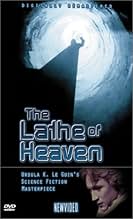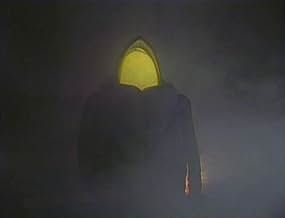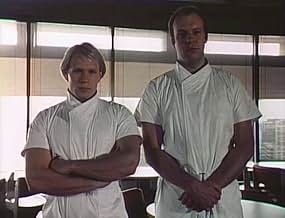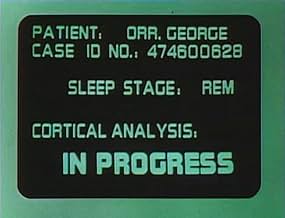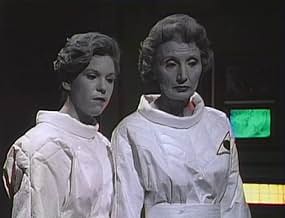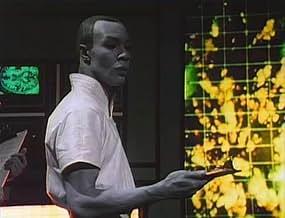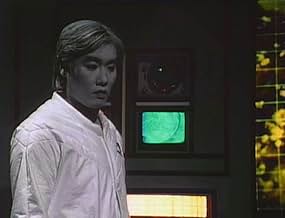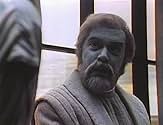The Lathe of Heaven
- Fernsehfilm
- 1980
- 1 Std. 45 Min.
IMDb-BEWERTUNG
7,1/10
2923
IHRE BEWERTUNG
Füge eine Handlung in deiner Sprache hinzuIn a highly controlled and overpopulated society, a man who has terrifying dreams that affect reality is assigned a psychiatrist who takes advantage of the situation.In a highly controlled and overpopulated society, a man who has terrifying dreams that affect reality is assigned a psychiatrist who takes advantage of the situation.In a highly controlled and overpopulated society, a man who has terrifying dreams that affect reality is assigned a psychiatrist who takes advantage of the situation.
- Regie
- Drehbuch
- Hauptbesetzung
- Auszeichnungen
- 1 Nominierung insgesamt
Peyton E. Park
- Mannie Ahrens
- (as Peyton Park)
James Bodean
- Guard
- (Nicht genannt)
John Rainone
- The Grey Person
- (Nicht genannt)
Ben Stephenson
- Scientist
- (Nicht genannt)
Empfohlene Bewertungen
I had public television on several days ago (March 10, 2001) and "Lathe of Heaven" was starting on their series "Movies Worth Taping". I'm glad I happened to turn the TV on, as it was a movie well worth watching! It was made in 1987 as the first made-for-public-TV film, and is based on a novel by Ursula Le Guin.
This movie explores the notion of "effective dreaming", where one's dreams actually come true. It explores the strange dreams of George Orr (Bruce Davison). When he has these dreams, he wakes to find that his dreamt-up situations are now not only reality, but other people suddenly have adapted as if this reality has been with the world for some time.
George is traumatized by these dreams, and seeks the help of Dr. William Haber (Kevin Conway). Dr. Haber's intentions are good, to harness the power of these effective dreams to the betterment of the world, but he clearly abuses the doctor-patient relationship and hypnotizes George to have specific kinds of dreams. One motto of this film might be "be careful what you dream about"!
I found the special effects sometimes interesting, but often heavy-handed and not so smoothly executed. The setting, sometime in the near future in Portland, Oregon, was inexplicably dreary, beyond the rain that the city is well known for. The character development could have been stronger, with ancillary characters like Dr. Haber's secretary and the very few others seeming to be made out of cardboard and lacking emotion. George and Heather LeLache (Margaret Avery), however, enjoyed more solid and believable depictions.
In spite of these criticisms, the film was an exciting journey into inner space that indulges us to think about deep philosophical questions. What is reality? Are there parallel realities? What is or should be knowable about the nature of existence (to me reminiscent a bit of "2010", one of my favorite science fiction films)? What happens if we dream each other into or out of reality? "The greatest good for the greatest number" or rights of the individual? Can we design a utopia or will we be doomed to experience accidents we never considered that render such a proposed utopia much less than ideal? "The Lathe of Heaven" doesn't have the fresh and exciting visual effects of earlier science fiction films like "2001" or later ones, but is an interesting film that is a must see for science fiction fans.
This movie explores the notion of "effective dreaming", where one's dreams actually come true. It explores the strange dreams of George Orr (Bruce Davison). When he has these dreams, he wakes to find that his dreamt-up situations are now not only reality, but other people suddenly have adapted as if this reality has been with the world for some time.
George is traumatized by these dreams, and seeks the help of Dr. William Haber (Kevin Conway). Dr. Haber's intentions are good, to harness the power of these effective dreams to the betterment of the world, but he clearly abuses the doctor-patient relationship and hypnotizes George to have specific kinds of dreams. One motto of this film might be "be careful what you dream about"!
I found the special effects sometimes interesting, but often heavy-handed and not so smoothly executed. The setting, sometime in the near future in Portland, Oregon, was inexplicably dreary, beyond the rain that the city is well known for. The character development could have been stronger, with ancillary characters like Dr. Haber's secretary and the very few others seeming to be made out of cardboard and lacking emotion. George and Heather LeLache (Margaret Avery), however, enjoyed more solid and believable depictions.
In spite of these criticisms, the film was an exciting journey into inner space that indulges us to think about deep philosophical questions. What is reality? Are there parallel realities? What is or should be knowable about the nature of existence (to me reminiscent a bit of "2010", one of my favorite science fiction films)? What happens if we dream each other into or out of reality? "The greatest good for the greatest number" or rights of the individual? Can we design a utopia or will we be doomed to experience accidents we never considered that render such a proposed utopia much less than ideal? "The Lathe of Heaven" doesn't have the fresh and exciting visual effects of earlier science fiction films like "2001" or later ones, but is an interesting film that is a must see for science fiction fans.
I find it hard to believe that a film this popular is out of reach. This was one of the few films that leaves the viewer rethinking one's philosophy about the future, the past, the present, and human kind!! Did I dream it? Is there some strange power that prevents us from sharing it with others? Was it meant to be seen by a few chosen people who let it into their collective souls and minds? I'm not crazy! What if the Augmenter is at work here? Dream well tonight..under the other moons light..remember the lessons..reserved for our sight..it may be forever..or later tonight..that this films message..finally takes flight. Everyone who mentions this film feels changed at least a little by it. Lets find out if its meant to be seen again. We must stop the Augmenter and change the future. Lets see it again!! Ha! Dream on!!
I found this during late-night channel surfing. I thoroughly enjoyed it. The effects were sometimes cheesy but often cool. The direction was creative and quite effective in bringing Ursula K. LeGuin's classic story to life. But BE WARNED: this is a WEIRD MOVIE. You have to be wanting a weird movie in order to really enjoy it. It takes quite a bit of thought to really follow the plot if you haven't read the book, but it's worth watching several times. It is not an action flick (there is very little action, and some people find it boring, possibly with good reason) but it brings up all kinds of interesting ideas and possibilities that sent my mind racing. Every situation is presented in a way that makes you really look at it and ponder it. And the emotional aspect is powerful at times and made me smile more than once. The camerawork, acting, and electronic background music are artistic and place the viewer in another world, one which I personally found beautiful, exciting, and awe-inspiring. If you like artsy, strange, contemplative film, you might want to check this out.
The Lathe of Heaven has just been re-released. It's being shown on many PBS stations, and is also now on video. This was all due to high fan demand.
This is a dreamy, scary sci-fi flick with strong moral lessons. It's almost like a play: set mostly in one place, with only three characters involved. The special effects aren't stunning, but they're perfectly effective. The story is wildly original: what would the world be like if your dreams all came true- not your daydreams, but the uncontrollable ones at night?
This is a dreamy, scary sci-fi flick with strong moral lessons. It's almost like a play: set mostly in one place, with only three characters involved. The special effects aren't stunning, but they're perfectly effective. The story is wildly original: what would the world be like if your dreams all came true- not your daydreams, but the uncontrollable ones at night?
As the die-hard science fiction fans know, special effects are great, but without a great story, it won't stand the test of time.
Based on Ursula K. Leguin's book, this is (I hear) a very faithful adaptation. And easily one of the very best made for t.v. movies ever.
The effects are low budget, but that's not important, the story is amazing. Great science fiction takes us away from the familiar structure of life we understand, and stands reason and convention on it's head. It makes us see the things that are so close to us they are invisible. Great science fiction frames the familiar, in a new context and sheds truth on things we were unable to recognize in their mundane form.
This story moved me, in the way the book Stranger in a Strange Land did. Like the first time I read 2001 (The movie is meaningless without the book).
It is a story about reality, how we perceive it, how we shape it. How we are important to everyone and every thing, as our actions shape not only our own sphere of existence, but ripple outward effecting everything. This is of course told in an abstracted way, but the message is clear.
If you are looking for crazy robots and sleek starships, move on.
If you are looking for a thought provoking story, that will stick with you for days, or as I see with myself and others here, decades, then this is a cult classic that you simply can not miss.
I would have given it a 10, but the effects are low budget, though that does not make it any less amazing.
Based on Ursula K. Leguin's book, this is (I hear) a very faithful adaptation. And easily one of the very best made for t.v. movies ever.
The effects are low budget, but that's not important, the story is amazing. Great science fiction takes us away from the familiar structure of life we understand, and stands reason and convention on it's head. It makes us see the things that are so close to us they are invisible. Great science fiction frames the familiar, in a new context and sheds truth on things we were unable to recognize in their mundane form.
This story moved me, in the way the book Stranger in a Strange Land did. Like the first time I read 2001 (The movie is meaningless without the book).
It is a story about reality, how we perceive it, how we shape it. How we are important to everyone and every thing, as our actions shape not only our own sphere of existence, but ripple outward effecting everything. This is of course told in an abstracted way, but the message is clear.
If you are looking for crazy robots and sleek starships, move on.
If you are looking for a thought provoking story, that will stick with you for days, or as I see with myself and others here, decades, then this is a cult classic that you simply can not miss.
I would have given it a 10, but the effects are low budget, though that does not make it any less amazing.
Wusstest du schon
- WissenswertesThe night that this was first broadcast, there was a major power outage in the Pacific Northwest, which meant that author Ursula K. Le Guin was unable to watch the film based on her own book on its first run.
- PatzerOn the government water distribution tanker truck, the word "mobile" is misspelled "MOBIL". Although, since this takes place in the future, it's possible the spelling has changed.
- VerbindungenFeatured in No Sleep TV3: Classic Episode #1: "Our All-Time Faves" (2015)
Top-Auswahl
Melde dich zum Bewerten an und greife auf die Watchlist für personalisierte Empfehlungen zu.
Details
- Erscheinungsdatum
- Herkunftsländer
- Offizieller Standort
- Sprache
- Auch bekannt als
- La rueda celeste
- Drehorte
- Produktionsfirmen
- Weitere beteiligte Unternehmen bei IMDbPro anzeigen
Zu dieser Seite beitragen
Bearbeitung vorschlagen oder fehlenden Inhalt hinzufügen

Oberste Lücke
By what name was The Lathe of Heaven (1980) officially released in Canada in English?
Antwort
